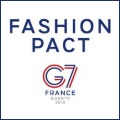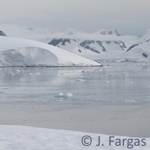The luxury and fashion industries sign the Fashion Pact in view of the G7 conference
 International luxury and fashion companies sign the sustainable committment for the planet which will be presented tomorrow at the G7.
International luxury and fashion companies sign the sustainable committment for the planet which will be presented tomorrow at the G7.
56 groups are now committed in the Fashion Pact(*): the aim is to involve of at least 20% of the global fashion industry as measured by volume of products and to have a mix of luxury, “mid-level” and “affordable” brands across the fashion sector and to build coalitions of committed public and private leaders that can make a difference on these challenges by scaling new solutions and massively redirecting investment flows towards low-carbon, low biodiversity impacts and resilient development.
Regarding the climate, the Pact wish to achieve ‘net-zero’ by 2050 by reducing and avoiding carbon emission, accompagning climate adaptation and resilience through sustainable sourcing of key raw materials, targetting 100% renewable energy across own operations with the ambition to incentivise implementation of renewables in all high impact manufacturing processes along the entire supply chain by 2030.
For the biodiversity, the Pact promotes regenerative approaches to agriculture that restore soil and grasslands and optimize biodiversity on farms, eliminate the sourcing from intensive feed-lot based farming and supporting production systems that optimize the animals’ time on natural pasture aligned with the adoption of animal welfare standards across the industry. It also aims to support material and process innovations that have no negative impact on key species and ecosystems and ensure that we do not contribute to the loss or degradation of natural forests, to promote ‘Wildlife friendly’ approaches to agriculture, mining and forestry.
In recognition of the rapidly degrading ocean environment, the fashion sector will commit to significantly reducing the negative impacts that it has on the ocean environment, in collaboration with other existing leading initiatives. It aims to eliminate the use of single use plastics (in both B2B and B2C packaging) by 2030, support innovation to eliminate micro-fibre pollution from the washing of synthetic materials, promote agricultural and mining production that do not result in chemical pollution through sustainable sourcing of raw materials, support efforts to educate consumers on product care to avoid micro-plastic pollution from washing, promote new technologies and adoption of pollution controls to safeguard the rivers and oceans from chemicals released through the fashion production supply-chain, and settle the implementation of guidelines (i.e. Operation Clean Sweep) on the best practice for managing (and controlling the release of) plastic pellets that are the ‘feedstock’ for plastic-based fibres and packaging.
The workshop has been launched in April 2019, in the perspective of the G7 conference, by the President Emmanuel Macron, who designated François-Henri Pinault, CEO of Kering, mobilize the involvement of textile-fashion industries under strategic goals to reduce their environmental impact.
(*) On October 25. 2019, the committed brands are: ADIDAS, AUCHAN RETAIL, BALLY, BESTSELLER, BURBERRY, CALZEDONIA GROUP, CAPRI HOLDINGS LIMITED, CARREFOUR, CELIO, CHANEL, DAMARTEX GROUP, DECATHLON, EL CORTE INGLES, ERALDA, ERMENEGILDO ZEGNA, EVERYBODY & EVERYONE, FARFETCH, FASHION3, FIGARET, FUNG GROUP, GALERIES LAFAYETTE, GANT, GAP Inc., GEOX, GIORGIO ARMANI, GROUPE BEAUMANOIR, GROUPE ERAM, GROUPE ETAM, GTS GROUP, H&M GROUP, HERMES, INDITEX, KARL LAGERFELD, KIABI, LADY LAWYER FASHION ARCHIVE, KERING, LA REDOUTE, MANGO, MATCHESFASHION.COM, MONCLER, NANA JUDY, NIKE, NORDSTROM, PAUL & JOE, PRADA GROUP, PROMOD, PUMA, PVH Corp., RALPH LAUREN, RUYI, SALVATORE FERRAGAMO, SELFRIDGES GROUP, SPARTOO-ANDRE, STELLA MCCARTNEY, TAPESTRY, THE VISUALITY CORPORATION.
(by alphabetical order)
Friday 23 August 2019, 15:25










